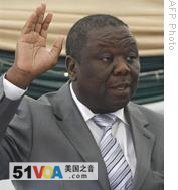Harare
19 May 2009
Zimbabwe's unity government is struggling to win financial support from western countries because very little progress is being made to resolve key outstanding issues, including those involving the Movement for Democratic Change, that prevent the government from meeting benchmarks set by countries.
 |
| Morgan Tsvangirai is sworn in as Zimbabwe's prime minister at the State House in Harare, 11 Feb 2009 |
But lawyers say that no perpetrators of violence against the MDC have been charged and that there is no investigation into last October's kidnapping of eighteen MDC and humanitarian workers. Seven MDC supporters remain missing.
Western governments say it is this type of activity that is against the rule of law and needs to end.
Last November, the Southern African Development Community, SADC, instructed the Zimbabwean leaders to settle disputes over the allocation of governor positions after the unity government was sworn in.
Nothing has been achieved on that level yet after many meetings of principals. Nor, despite the global political agreement signed by the parties last September, have top civil servant jobs been re-allocated based on the outcome of elections in March 2008.
 |
| Zimbabwe's President Robert Mugabe, 10 May 2009 |
Farmers say commitment to the rule of law as demanded by the political agreement is ignored by ZANU-PF in its continued attempts to fast track prosecutions aimed at forcing white farmers from their land, even though most have existing court orders allowing them to remain.
Most say they failed to meet the mid May deadline for planting wheat because of ongoing disruptions and prosecutions.
The independent Zimbabwe Media Monitoring Project says in its latest report that the public media continues to be partisan towards ZANU-PF.
Earlier this week Prime Minister Morgan Tsvangirai urged SADC and the African Union to bring an end to what he typified a deadlock over these issues. The two organizations are guarantors of the global political agreement between the parties.
But experts say it requires the agreement of at least two of three parties to the agreement to declare a deadlock before the African organizations would arbitrate.
Eldred Masunungure a political scientist at the University of Zimbabwe tells VOA that without progress on the outstanding issues the unity is "dysfunctional" and will be unable to move the country forward. He said that Mr. Tsvangirai appeared to believe, after many meetings with Mr Mugabe, that "quiet diplomacy was more useful than megaphone diplomacy."
Masunungure added that the MDC's national council has been insisting that Mr. Tsvangirai become more militant and aggressive in his dealings with Mr Mugabe.
Western governments have been providing direct humanitarian assistance to Zimbabweans, but have not given any assistance to the government for its programs. They are looking for progress on resolving the outstanding issues and meeting other benchmarks, mostly involving governance. Western diplomats say they are not encouraged by progress so far.
Although the World Bank has given a grant of $22 million and the International Monetary Fund is now in Zimbabwe for consultations, arrears have to be paid before any substantial loans will emerge.
So far neither SADC chairman, South African president Jacob Zuma, nor the AU have responded to Mr. Tsvangirai's call on Sunday for the two organisations to exercise their commitments as guarantors of the agreement.